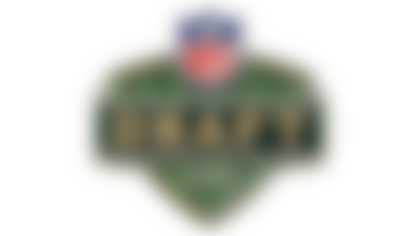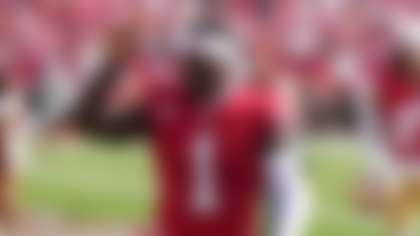Matt Barkley could be the next Tom Brady and should be the Philadelphia Eagles' quarterback of the future.
Brandt: Ready-to-go rookies
Gil Brandt looks beyond the prospects picked in Round 1 to find nine rookies in a position to make an immediate impact. **More ...**
Don't laugh. That statement is based on my belief that the Eagles' fourth-round selection steps into a perfect situation that sets him up for individual success, while giving a championship-starved franchise a young quarterback with the pedigree to carry Philly over the threshold. With veteran Michael Vick ahead of Barkley on the depth chart right now, it's a situation reminiscent of Brady playing behind Drew Bledsoe for a season in 2000 before emerging to take over the New England Patriots' offense in 2001.
A closer look at the dynamics of Philadelphia's new offensive philosophy, coaching staff and personnel leads me to believe that Barkley will not only outplay his counterparts early in his career, but he will guide the Eagles back to prominence.
Here are four reasons why:
1) Chip Kelly's desire to play at a fast tempo plays to the strengths of Barkley's game.
All the conversation about Kelly's offensive philosophy revolving around the spread option is incorrect. The Eagles' system will be based around the notion of playing at a breakneck pace. Kelly is one of the biggest proponents of no-huddle football. He will implement a warp-speed approach in Philadelphia.
To operate at blinding speed, the quarterback must be able to process a tremendous amount of information quickly while getting the team in the proper play. Additionally, the quarterback must have a thorough understanding of the game plan and defensive concepts to make the correct checks and adjustments at the line of scrimmage.
Barkley is a cerebral quarterback with an exceptionally high football IQ. He processes information quickly, makes sound decisions under duress and enters the league with a thorough understanding of pro offensive concepts after spending four years in a complex system at USC. Most importantly, Barkley gained some experience directing a no-huddle offense during his junior and senior seasons (and directing two-minute drills throughout his career). Now, those moments certainly pale in comparison to directing a frenetic attack like the one Kelly orchestrated at Oregon, but it provided the Eagles' coach with a glimpse of how well Barkley could operate within a lightning-paced offense built on speed and tempo.
Pondering how the no-huddle could work with Barkley, I can envision the Eagles utilizing an approach that is similar to the methods employed in Denver and New England, with Peyton Manning and Brady at the respective controls. Both veterans are masters at changing the pace of the game -- based on the reaction of the defense -- to create an advantage for the offense. Additionally, the rapid pace forces defensive coordinators to utilize simple schemes due to concerns about communication issues between the defenders. Without having to worry about deciphering complex pre-snap looks, a young quarterback like Barkley could thrive early in his career as a passer and playmaker.
2) Pat Shurmur's familiarity with West Coast principles will benefit Barkley.
Observers have speculated that Kelly would attempt to bring his zone-read system to the NFL, but the hiring of Shurmur as the Eagles' offensive coordinator makes it highly likely the team will use a hybrid offense with several West Coast principles. This makes the Barkley pick a sensible one, given his experience running a similar system at USC.
Sure, Lane Kiffin's version of the West Coast offense is certainly different than the one likely to be employed by the Eagles, but the verbiage and concepts will transfer over. Barkley will enter the NFL with a working knowledge of the Eagles' base scheme. That knowledge will accelerate his learning curve and allow Kelly to load him up with information early in the installation process.
Brooks: Bears get a big boost
The recent decision to incorporate the read-option into its offense will pay big dividends in Chicago, Bucky Brooks writes. **More ...**
Additionally, Barkley's familiarity with the West Coast offense will help him master the checks and adjustments used at the line of scrimmage. Kelly's desire to operate at a breakneck pace makes it mandatory for the starting quarterback to make quick decisions at the line. Barkley's thorough understanding of the offense should help him make sound decisions under duress, which bodes well for Kelly getting the pace and tempo he desires.
Now, I know there has been some concern about Barkley's marginal athleticism, and how he would fit into a system that also features some zone-read concepts. But the beauty of the zone-read is the myriad of variations that can be utilized to help a non-athletic quarterback thrive as the point man. From the incorporation of the bubble screen on the backside of the zone-read to the implementation of packaged plays (run-pass combination plays that give the quarterback options based on the reaction of the defense), Barkley certainly has the instincts and football IQ to successfully execute the concept.
Remember, the quarterback in Kelly's Oregon system didn't run that often -- Marcus Mariota logged 106 carries in 13 games last season, an average of 8.2 attempts per contest -- so inserting a non-runner shouldn't dramatically affect the potency of the attack.
3) The Eagles' explosive perimeter weapons will make the game easier for Barkley.
Barkley isn't viewed as a transcendent franchise quarterback in the mold of Cam Newton, Andrew Luck or Robert Griffin III, but that doesn't mean he can't develop into a championship-caliber signal-caller with the right pieces around him.
I've watched Barkley progress throughout his career and believe he is the ultimate game manager, with a "pass-first" point guard mentality that allows him to distribute the ball to the open guy, rather than forcing it to a designated playmaker. During his final two seasons at USC, Barkley's top two targets (Robert Woods and Marqise Lee) averaged 93.5 and 95.5 receptions per season, respectively. Additionally, Barkley frequently targeted the Trojans' tight ends and running backs, offsetting the two-deep coverage utilized by most opponents to take away the explosive weapons on the outside. This was particularly effective in 2011, when Barkley directed a USC offense that finished with eight players boasting 10 or more receptions, including a pair of tight ends (Randall Telfer and Xavier Grimble) who combined to snag 41 balls for 417 yards and nine touchdowns.
In Philadelphia, Barkley is surrounded by the kind of talent that should encourage him to spread the wealth in the passing game. On the perimeter, he has a pair of dynamic pass catchers in Jeremy Maclin and DeSean Jackson. Both guys have shown the capacity to take over games from their respective positions. Maclin functions primarily as a possession receiver, while Jackson acts as the big-play threat on the outside. Collectively, they pose problems to opponents with their speed and burst.
At tight end and fullback/H-back, the Eagles have an intriguing trio of playmakers (Brent Celek, James Casey and rookie Zach Ertz) with the potential to wreak havoc between the hashes. Each player possesses the size, speed and athleticism to work down the seam, while also showing the versatility to align as a quasi-receiver in open formations to create mismatches. This gives Kelly the ability to utilize a variety of formations from "12" (one back, two tight ends and two receivers) and "21" (two backs, one tight end and two receivers) personnel packages, helping his quarterback find easy completions in the passing game.
Factor in an explosive running game featuring LeSean McCoy and Bryce Brown, and Barkley steps into a high-revving offense that simply needs an efficient conductor at the helm. With 47 collegiate starts directing a high-powered offense at USC, Barkley is primed to fill the role as the Eagles' eventual starter.
4) Playing behind Michael Vick for a season will help Barkley enjoy success in 2014.
Debate: Best and worst backup QBs

Having Kirk Cousins on hand gives the Washington Redskins plenty of security at QB. Other teams aren't so lucky. **More ...**
Changing dynamics of the NFL have observers expecting young quarterbacks to start immediately. But the old-school method of slowly introducing the pro game to embryonic signal-callers continues to be an effective approach. Take a look at the careers of Tom Brady, Aaron Rodgers and, most recently, Colin Kaepernick. Sitting behind an established starter can provide a young quarterback with enough time to acclimate to the pro game.
With Vick in the fold, Barkley steps into a situation that should afford him that opportunity. The veteran is in line to win a training-camp battle for the starting job, which would allow Barkley wait in the wings as the backup or No. 3 quarterback (behind Nick Foles) in his rookie season. This would allow him to watch the game from afar, avoiding the immense pressure and scrutiny that comes with stepping onto the field as a rookie starter. Additionally, it would give Kelly and his staff enough time to develop Barkley's skills on the practice field, fully preparing him for the pro game.
Sure, there have been several recent examples of young quarterbacks playing better than expected in Year 1, but the model for long-term success typically involves sitting and watching for some time before being handed the keys to the car. While Barkley could be primed and ready to roll as a rookie, the opportunity to cultivate his ability and build future game plans around his strengths could pay huge dividends for the Eagles down the road.
Follow Bucky Brooks on Twitter @BuckyBrooks












